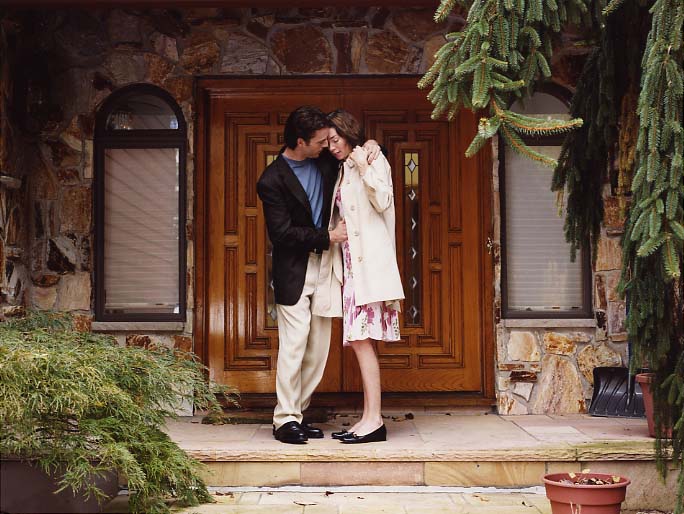PARK CITY, UTAH – I have seen one of the wisest films I can remember about love and human intimacy. It is a film of integrity and truth, acted fearlessly, written and directed with quiet, implacable skill. I will not forget it. Now here is a dilemma: The film is so truthful and observant, so subtle and knowing about human nature, that it may be too much for most audiences. Moviegoers demand a little something in the way of formula, if only for reassurance, or as a road sign.
The movie is “Flannel Pajamas,” directed by Jeff Lipsky. It is his second feature in 10 years, after “Childhood’s End’ (1997, no relation to the Arthur C. Clarke. novel). That one I never saw. But I see Lipsky a lot, because he is a tireless distributor of independent films, a regular at all the festivals. He started at New Yorker Films, and co-founded both October Films and Lot 47. He knows the cinema.
Now he is back with this difficult, relentless, sad and true film about two people who meet on a blind date, fall deeply into love, get married, and see the marriage gradually fall apart. It is clear to us whose fault the failure really is, but not clear to either of the characters. It may be that childhood events made a marriage impossible. We see a lot of their family members, who give us a good idea of what they were up against.
The film stars Julianne Nicholson and Justin Kirk as New Yorkers who meet on a blind date arranged by their therapist. They fall in love during their first conversation, are married, are happy at first, and then become unhappy. But their unhappiness is not the stuff of melodrama; it’s an accumulation of small moments that build a deep divide between them. Lipsky demands of his actors no less than Bergman required in “Scenes from a Marriage” or “The Passion of Anna,” and although the acting here is not showy, it is quietly, powerfully good.
I’ve noticed Julianne Nicholson a lot in good movies; rent “Tully” for a heartwarming American family drama. She played Jenny on “Ally McBeal.” She’s thin, freckled, quiet, warm, pulls you in instead of going after you. Here she has a hard assignment: She must at all times seem reasonable, logical and sane, while in almost invisible ways sabotages her marriage. Justin Kirk’s character desperately wants to please her but cannot, and never understands that he can’t, or why he can’t.
The extended family scenes (especially a conversation between Kirk and Rebecca Schull, as his mother-in-law) are fraught with hidden messages. But most of the film takes place between two people who begin in happiness and are blindsided by their own hidden natures. The film is deep and demanding and not easy to experience, but it is formidable.
* * *
Faithful readers will recall The Kid. They will remember my reports about how hopeful filmmakers press copies of their DVDs upon me, hoping that I will ignore the official Sundance entries, repair to my room, and watch their work on video. Regretfully but firmly I must decline these gifts, because I have not come all this way to miss official screenings in order to look at the latest product of the DVD-R drive on somebody’s computer.
But it was a different matter with The Kid. He accosted me on opening night in 1999 in the theater lobby. His film, named “Bobby Loves Mangos,” was only 20 minutes long. It was brilliant, he assured me. “Someday I’ll be a great director, and I will remind you of this moment,” he told me. I wished him well but did not allow him to press the video into my hands.
The next day I was standing in the coffee bar of the Yarrow Hotel, and a voice in my ear confided that The Kid’s film would begin in 10 seconds on the giant-screen TV over the bar. It was The Kid.
“What’d you do? Bribe the manager?” I asked.
“Kind of,” he said.
“But I have to go to a press screening in 10 minutes,” I said.
“I’ll have them hold it for you,” he assured me. “I work here.”
“Hold it?” I said. “They’re not gonna keep three dozen people waiting so that…”
“Don’t miss the opening scene,” he said.
I watched the film. Sitting next to me was Paul LeMat, star of “American Graffiti” and many other movies. He watched it too. “This is pretty good,” I said. He agreed. It was.
I wrote about The Kid, whose name was Stuart Acher. He got an agent. He started making commercials and music videos. He wrote some TV shows. There was a bittersweet triumph when his commercial “Super Absorbent,” starring the GAP girl Shalom Harlow, was on Fox’s “the best commercials you’ll never see.” But there was no feature film. It is not that easy to get a feature film off the ground, no matter how well your short subject plays in the Yarrow coffee bar.
Now it is Sundance 2006. I am on the shuttle bus to the Eccles Center. A voice in my ear says, “I’m still here.” It was The Kid. He had good news for me.
“I’m directing my first feature film this summer! It’s titled ‘Abducted’ and I wrote it with Neil Pollner. It’s a sci-fi film. This is Kimberley Boyd. She is my producer.”
I can’t wait to see Acher’s film. I hope it plays Sundance. If it doesn’t, I have a feeling I will see it anyway, maybe in the Yarrow coffee bar. Will Acher be a great director someday? I think it is a promising sign that he made a commercial too good to be aired.












